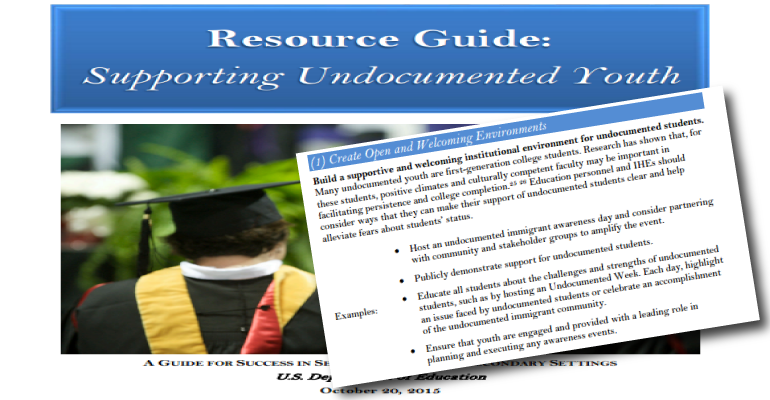
On Tuesday, the U.S. Department of Education issued its Resource Guide Supporting Undocumented Youth in which it suggests ways schools can make undocumented students feel welcome. On Thursday, in response to unspecified media reports, Arizona Superintendent of Public Instruction Diane Douglas issued a statement rejecting the guide’s content.
Among the more controversial proposals found in the guide is the suggestion that schools host an “Undocumented Week.” According to the guide, during each day of “Undocumented Week,” schools can “highlight an issue faced by undocumented students or celebrate an accomplishment of the undocumented immigrant community.”
In her statement, Douglas made it clear that the Arizona Department of Education was not involved with, and “does not support,” the activities outlined in the Guide For Success In Secondary And Postsecondary Settings. She emphasized in her otherwise cryptic press release that the guide was not published by the Arizona Department of Education.
The release reads in part: “Superintendent of Public Instruction Diane Douglas’s recent AZ Kids Can’t Afford to Wait! Plan addresses the special needs of the undocumented youth who flooded the Arizona education system due to actions by the federal government. However, the Superintendent does not support the activities proposed in the federal report widely publicized locally by the media this morning.”
When asked what suggested activities she does not support, spokesperson Sally Stewart told the Arizona Daily Independent, “The Superintendent’s mission is to facilitate an excellent education for all Arizona students. There was an early media report that suggested schools celebrate undocumented youth and as a duly elected official of Arizona, the Superintendent cannot support this type of celebration.”
Related article: The UACs are the keys to Southwest Key’s success
The guide focuses on what state departments of education can do to “support student academic and social success, and to work collaboratively with youth and their families to find creative ways to finance college costs.”
The Department advises in the guide that it “will in coming months release a separate resource guide on early learning and elementary education that includes promising practices for serving undocumented children and children of undocumented parents.” The Department calls on educators, schools, and campuses to, “as they see fit, draw upon the tips and examples in this Guide to better support undocumented youth and, ultimately, move us closer to the promise of college and career readiness for all.”
Under the heading, Create Open and Welcoming Environments, the guide recommends:
Embrace and value diversity and the cultural backgrounds of all students. Teachers (and other educational personnel) who serve immigrant students should understand the cultural and educational backgrounds of their students. The development of trusting relationships with educators is especially important for undocumented youth, and affirming attitudes toward students’ backgrounds and cultures may help to facilitate greater mutual trust.
Examples:
• Model multicultural sensitivity for students and other personnel. To be effective, cultural competency and advocacy must be implemented on multiple levels, and modeling is one approach for achieving this.
• Engage in self-reflection to address personal biases and increase multicultural competence.
• Proactively address bullying or subtle forms of discrimination between peers, education personnel, and others.
• Incorporate discussions around diversity and immigration into instruction.
• Plan and host trainings on multicultural issues that educate teachers and staff about the unique needs and challenges of undocumented students.
Withhold judgment and biases about immigration status. Educators and other personnel should not make assumptions about students’ immigration status – including assuming that ethnicity or speaking languages other than English imply non-citizen status.
Examples:
• Do not inquire about a student’s immigration status. Youth may have legitimate fears about disclosing this information.
• Ensure that all students have access to important information about the educational rights of undocumented youth.
• If a youth discloses his or her immigration status, convey openness and an assurance of confidentiality in discussing the topic.
• Keep in mind that some students may not have immigration-related documents that are needed for some school activities, such as field trips across national borders and study-abroad opportunities.
The irony of a federal agency advising states on the proper treatment of undocumented children, while other federal agencies process those same children through shelters in which they are deprived of adequate food and clothing, is not lost on those familiar with the shelters. While Douglas objected to the fact that children are “randomly dropped off around the state of Arizona by the federal government,” currently the Arizona Department of Education through the Health and Nutrition Services Division provides National School Lunch Program claim payments to Southwest Key’s Unaccompanied Alien Minor shelter.
Related articles:
ACLU to fight for abortions for undocumented children
Oracle residents denied Sycamore UACs access
Arizona residents, UACs harmed by lack of oversight
Sycamore runaways had good reason for leaving
2 runaways returned to Oracle’s Sycamore Canyon Academy
Shelter for UACs at Sycamore Boys Academy reveals Arizona childcare chaos
